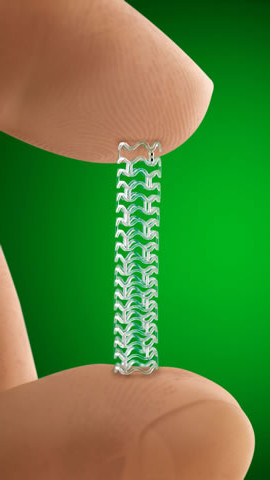Heart implant recalled
 A surgically-implanted heart device is being recalled.
A surgically-implanted heart device is being recalled.
The heart device, which dissolves in the body and leaves no metal traces behind, is being recalled after it was linked to elevated rates of heart attacks and blood clots.
The Absorb Bioresorbable Vascular Scaffold system is used to hold open blocked coronary arteries, and is fully absorbed by the body over time.
The Therapeutic Goods Administration (TGA) has removed the device from the Australian Register of Therapeutic Goods (ARTG).
“The decision to undertake this recall and remove Absorb BVS System … was based on data from recent analyses that showed an elevated rate of major adverse cardiac events, specifically heart attack and blood clot, when compared to patients treated with an another alternate stent,” the TGA said.
Health experts say the dissolvable stents are a relatively new technology, and so are only used by a smaller number of patients.
The authorities say patients with the Absorb stent should talk to their doctor and learn the signs and symptoms of heart attack and blood clot.
“If you experience any new cardiac-related symptoms, such as irregular heartbeats, chest pain, or shortness of breath, seek immediate medical attention,” the TGA said.
Patients are also advised to continue taking medicines, known as dual antiplatelet therapy (DAPT), to reduce the risks of heart attack and blood clot.
The TGA has contacted doctors who have used the device.
The manufacturer, Abbott Vascular Australia, is recalling all unused stock of the device.
Abbott says the use of the stent is limited “to select hospitals in a clinical trial setting to monitor implantation technique”.
“Data from Absorb trials around the world demonstrate that when current implantation technique is used, efficacy and safety results are comparable to the gold-standard metallic drug-eluting Xience stent [also produced by Abbott Vascular], with the added feature of leaving no metal behind once it dissolves,” a company spokesperson said.
“The majority of hospitals currently using Absorb in Australia are already part of studies that are planned to be part of the clinical registries.”
The manufacturer says the risk of blood clots with the Absorb stent is similar to other devices.
“The overall rate for stent thrombosis (blood clot) in Australia since Absorb was introduced in 2013 is less than 0.8 per cent; and 0.2 per cent since the introduction of current implantation technique in 2015,” the spokesperson said.
“These are comparable stent thrombosis rates for metallic drug-eluting stents, which are typically from less than 1 per cent in the first year to 0.5 per cent in subsequent years.”








 Print
Print